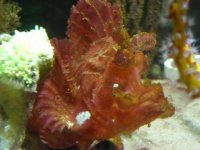- Location
- Montclair, NJ
Dom can I make a suggestion. As i'm sure you know, Octopi die after egglaying. Not so much after laying the eggs but after guarding them until hatching since the mother doesnt go out hunting. Perhaps ( and disclaimer this just a conjecture on my part ) if you take away her eggs, she will resume normal hunting and eating and her life span will be longer.
In theory that seems like a good idea but nothing is going to stop nature from taking its course. This topic has been heavily debated when it comes to medicating dying Octos. For me, prolonging the life of the Octo in an unatural way only increases the chances of suffering. The last thing I want to do is prolong the life of the Octo so when it's organs start failing that it has to suffer through all of the bacterial infections and literally begins to melt (fall apart) alive. I was actually hoping the octo would have a so called "heart attack" and die quickly. I've even looked into humane euthanzing methods.
I'd also argue that the will to live is much stronger when the eggs are present. That is why Tuesday next week I'm going to take the last of the eggs away. It is going to be hard and extremely sad but watching the Octo decompose alive is something I don't want to be responsible for.
Last edited:


































